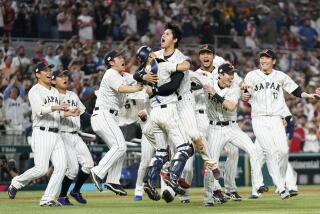Schiller becomes baseball’s point man for the Olympics
- Share via
Harvey Schiller has had the challenge of working for both George Steinbrenner and Ted Turner, so there’s little doubt he’s familiar with the art of diplomacy. And that figures to come in handy in his latest role: directing the International Baseball Federation, which elected him president Friday in Beijing.
Schiller’s election comes at a crucial time for international baseball, which is lobbying for reinstatement to the Olympics. Baseball made its debut as a medal sport in 1992, while Schiller was executive director of the U.S. Olympic Committee. But 20 months ago, the International Olympic Committee voted to drop the sport from the Games, beginning in 2012.
So building off the success of last spring’s World Baseball Classic, in which Japan bested a 16-team field, Schiller declared in a conference call shortly after his election that he had developed a “manifesto” designed to strengthen the sport internationally, thereby improving its chances of someday returning to the Olympics.
Schiller also took questions.
Question: The IBAF already has its own world championship tournament and the success of the World Baseball Classic clearly showed the sport can stage a major event apart from the Olympic Games. So why the preoccupation with returning to the Olympic calendar?
Answer: Outside the borders of North America, the funding for the 112, 113 member nations of the IBAF is very, very heavily dependent on their governments. And that support, in almost each and every case, is tied to the presence of baseball on the Olympic program. The most important thing is to continue to grow the development of baseball around the world. More participants, better officials. And as the game grows there will be more acceptance in the Olympic Games.
Q: It sounds like a vicious cycle. National programs need money to develop competitive teams, but without enough competitive teams there won’t be an Olympic tournament to spur the government funding needed to make that happen.
A: Most of these countries, even with the money they do get from their national organizations, are underfinanced. Especially in those that one might call developing countries. The former members of the Soviet Bloc, those countries that are in places like Africa, to help them develop is going to take equipment and money. Part of my manifesto is to seek out additional funds through sponsorships, marketing and media.
Q: Why media?
A: Media is an important part for distributing baseball broadcasting so people understand what the game is about. So it’s not just about being in the Olympics. It’s about making baseball truly a global sport.
Q: Funding may be key to getting the sport back in the Olympics, but that wasn’t among the major issues the IOC cited in 2005 when it voted baseball out of the Games.
A: Two parts of that, which always come up, are the presence of professional players in the game and the focus on anti-doping. Both of those have moved forward in these past years and they will be readdressed with Major League Baseball and others.
And I think we’ll have complete cooperation from the players’ unions -- not just in the United States but from all other professional leagues -- as well as the discussion of the utilization of more professional players.
Q: With the exception of last spring’s World Baseball Classic, the U.S. has largely been excluded from playing host to large international baseball events not associated with the Olympics or Pan American Games. Is that something you plan to address?
A: The success of the World Baseball Classic was significant and well measured by the members of the IBAF. So I do anticipate that there will be events of a world and regional nature in the United States in the future.
*
More to Read
Go beyond the scoreboard
Get the latest on L.A.'s teams in the daily Sports Report newsletter.
You may occasionally receive promotional content from the Los Angeles Times.







